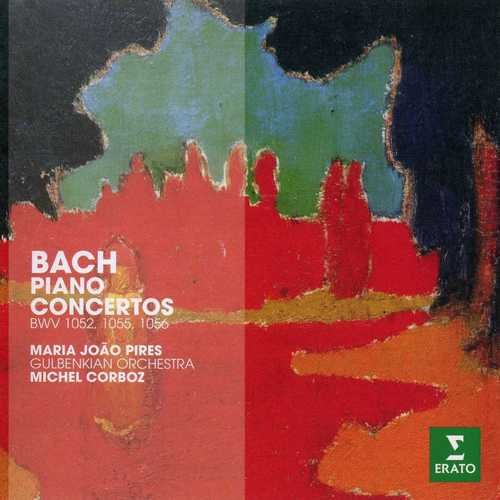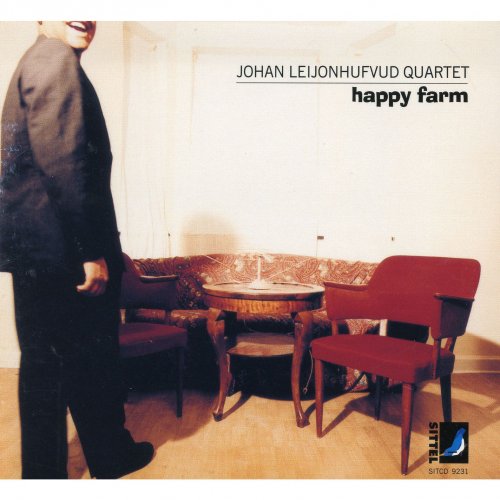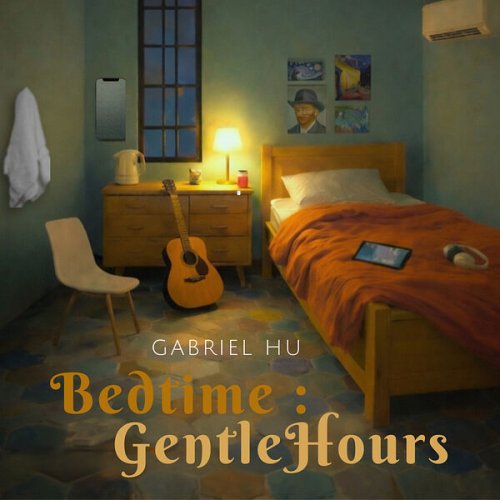Maria João Pires, Gulbenkian Orchestra, Michel Corboz - J.S. Bach: Piano Concertos BWV 1052, 1055, 1056 (2014)

Artist: Maria João Pires, Gulbenkian Orchestra, Michel Corboz
Title: J.S. Bach: Piano Concertos BWV 1052, 1055, 1056
Year Of Release: 2014
Label: Erato
Genre: Classical
Quality: FLAC (tracks+.cue,log,scans)
Total Time: 50:51
Total Size: 245 Mb
WebSite: Album Preview
Tracklist: Title: J.S. Bach: Piano Concertos BWV 1052, 1055, 1056
Year Of Release: 2014
Label: Erato
Genre: Classical
Quality: FLAC (tracks+.cue,log,scans)
Total Time: 50:51
Total Size: 245 Mb
WebSite: Album Preview
Piano Concerto No.1 in D minor, BWV 1052
01. I. Allegro (8:06)
02. II. Adagio (9:12)
03. III. Allegro (8:18)
Piano Concerto No.4 in A major, BWV 1055
04. I. Allegro (4:47)
05. II. Larghetto (5:07)
06. III. Allegro ma non tanto (4:36)
Piano Concerto No.5 in F minor, BWV 1056
07. I. Allegro (3:50)
08. II. Largo (3:13)
09. III. Presto (3:42)
Performers:
Maria João Pires - piano
Gulbenkian Orchestra
conductor - Michel Corboz
Maria João Pires (b. 1944) recorded this recital some years ago; it is thankfully back in the catalog now, finally available again after so many years, thanks to Apex. There are many aspects of the recording which show their age considering the general approach to Bach on the piano in the year 2013—the slower tempos in the fast movements, the thicker orchestral textures, the expressive use of rubato, the numerous hairpin phrasings, especially in the strings. Yet the performances hold up well simply because Pires and Corboz are so in tune with the characters of each of these individual works. The great D-Minor Concerto is splendidly performed. The tempos here are perfectly chosen (how many performances of this work sound like perpetual-motion studies?), the passagework is crystal clear, the sound of the individual notes rounded and bouncy, the dialogue between soloist and orchestra is palpable, and the intensity of the whole is felt from beginning to end. There is reverence for the work, but never does that inhibit expressivity. Pires gives the wonderful bubbly A-Major Concerto a gentle lilt in the first movement—it feels a bit slow at first, yet she is careful to maintain a lovely sense of momentum throughout. After the intensely lyrical and impassioned second movement, the forces end on a sprightly and joyous note in the light-hearted finale. The F-Minor Concerto has a nervous energy in the opening movement, which is highlighted by the restrained dynamics chosen. This paves the way for one of the truly remarkable moments in this recital: the slow movement to the F-Minor Concerto, surely one of Bach’s most beautiful and inspired instrumental ariosos. Here the artists pull back the dynamics to not more than Piano for most of the movement, drawing the listener ever closer in; one’s attention never wavers here, so intent is one on not missing a single second of this tender masterpiece. The finale’s effect is heightened as a result, perhaps ever more so as one waits for the delayed resolution at the second movement’s conclusion.
Though one may prefer the sprightlier tempos of today, less vibrato, leaner orchestral textures, and the like (I don’t always), there is a quality in these performances, which makes them timeless. Pires captures the spirit of this music like no other performer I know. I would not give up my Gould, my Schiff, my Edwin Fischer, my Horszowski, or numerous others in my collection, but for those interested in yet another side of this composer, one which I will surely return to often, Pires makes for an easy recommendation. Grab it while it’s still available! -- Scott Noriega
Though one may prefer the sprightlier tempos of today, less vibrato, leaner orchestral textures, and the like (I don’t always), there is a quality in these performances, which makes them timeless. Pires captures the spirit of this music like no other performer I know. I would not give up my Gould, my Schiff, my Edwin Fischer, my Horszowski, or numerous others in my collection, but for those interested in yet another side of this composer, one which I will surely return to often, Pires makes for an easy recommendation. Grab it while it’s still available! -- Scott Noriega
![Ramon Mirabet, Perico Sambeat, Jorge Rossy & Albert Sanz - Songs I Heard (All Star Jazz Project / feat. Masa Kamaguchi) (2026) [Hi-Res] Ramon Mirabet, Perico Sambeat, Jorge Rossy & Albert Sanz - Songs I Heard (All Star Jazz Project / feat. Masa Kamaguchi) (2026) [Hi-Res]](https://www.dibpic.com/uploads/posts/2026-02/1771139751_cover.jpg)
![AKU! - SHI 匹 死 (2026) [Hi-Res] AKU! - SHI 匹 死 (2026) [Hi-Res]](https://img.israbox.com/img/2026-02/14/jcbrzjzstl2k3pfymuh3dzwnp.jpg)
![Julian Lage - View with a room & The layers (2023) [UHQ-CD] Julian Lage - View with a room & The layers (2023) [UHQ-CD]](https://www.dibpic.com/uploads/posts/2026-02/1771252057_front.jpg)

![Charles Owens Trio - 10 Years (Anniversary Edition) (2026) [Hi-Res] Charles Owens Trio - 10 Years (Anniversary Edition) (2026) [Hi-Res]](https://www.dibpic.com/uploads/posts/2026-02/1770942375_qq3q442wai8jz_600.jpg)



![Jacob Anderskov - Vinterstemmer (2026) [Hi-Res] Jacob Anderskov - Vinterstemmer (2026) [Hi-Res]](https://www.dibpic.com/uploads/posts/2026-02/1771036914_d0s5qxbxc5g5l_600.jpg)